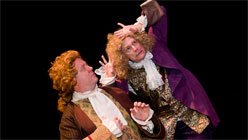Several years ago, in the summer of 2008, I reviewed Bach at Leipzig for KQED. At the time, I thought it was one of the smartest, funniest, most perfectly crafted plays I’d ever seen. I still do. Later that year, its playwright, Itamar Moses, debuted his love-letter to his alma mater, Berkeley High School, called Yellowjackets at Berkeley Rep. For the record, I mostly hated that play, and worried aloud that if Moses was not careful, he’d soon be selling his soul to Disney. Since then, Moses has become known for his work as a writer and story editor on Martin Scorcese’s Boardwalk Empire. That’ll teach me.
The latest production of Bach at Leipzig, playing now through April 22, 2012, at the Pear Avenue Theatre in Mountain View, reminds us why Moses’ work has generated so much buzz. Though the staging within the confines of the Pear is necessarily different than it was when Shakespeare Santa Cruz produced it in 2008, and while the actors as a group don’t appear quite as comfortable in their characters as Stephen Caffrey, Larry Paulsen and the rest of that 2008 company did, the performances are solid and the show’s production values, from its costumes to its set and sound, help sell the quick dialogue and witty word play about six musicians auditioning for the prestigious post of house organist at the Thomaskirche in Leipzig, Germany, an event that really did take place in 1722.
Although I can definitely recommend this version of Bach, the performance I saw did not begin especially well, and took too long to warm up. Troy Johnson, who plays Johann Friedrich Fasch, got off on the wrong foot, delivering his opening lines in a flat, almost emotionless monotone. Part of the fun of this play is that the dialogue is supposed to mimic a fugue, a type of polyphonic music in which multiple harmonious themes play upon each other to create a sum that is greater than its parts. To use a more contemporary music analogy, think of the words the actors speak as notes in a pop song’s melody, some of which are intended to be the melody’s “hooks,” those combinations of notes that grab the listener and make a song memorable. So, as Fasch stands before us, reading aloud a letter to his wife, Anna, his frequent references to her as his “gingersnap,” “meadow,” “lamb” and “milk-skinned moppet” are the hooks, the words that are supposed to stand apart from the exposition, memorable for their associative repetition but also informative for what they tell us about Fasch and his relationship with his wife. In Johnson’s performance, though, these notes were buried by a bland delivery style along with the rest of his lines, as if one were no more or less important than another.
A different sort of problem reared its head in the next scene, in which Fasch encounters Georg Balthasar Schott (Dale Albright), who bars the door to the Thomaskirche, where Fasch’s elderly former teacher, Johann Kuhnau, is holding forth on the church organ. Chemistry between Fasch and Schott is critical, since each of these moral and musical antagonists holds the key to the other’s ability to come to terms with his place in Kuhnau’s formidable legacy, but no sparks flew during the first act of the show I saw. Johnson mostly blustered, while Albright was merely dismissive, revealing too early the chip on his shoulder for never being held in Kuhnau’s esteem.
Things got better when Georg Lenck (Charles McKeithan) made his entrance. McKeithan has always had great stage presence, and his arching eyebrows and sly glances quickly convince us he’s every bit the gambling pickpocket he’s reputed to be. Also upping the energy level was the appearance of Johann Martin Steindorff (William J. Brown III) and Georg Friedrich Kaufmann (Jim Johnson), although I wish Johnson’s moments of insight as the fatally credulous Kaufmann had been more differentiated from the rest of his speech — like Fasch’s pet names for his wife, Kaufmann’s epiphanies should have been his hooks. But by the time Todd Wright’s Johann Christoph Graupner, the second greatest organist in Germany, made his noisy debut, the rest of the cast was ready, which made act two an unqualified delight.


